Delhi restaurant cannot use Burger King in its name: SC

Delhi restaurant cannot use Burger King in its name: SC
On Monday, the Supreme Court of India rendered a decision to reject a petition that contested a verdict issued by the Delhi High Court. This initial ruling from the Delhi High Court had effectively restrained a family-oriented restaurant in Delhi from utilizing the Burger King trademark. The Supreme Court’s dismissal of this plea reaffirms the previous legal directive and maintains the restrictions on the restaurant’s use of the Burger King brand name.
The matter at hand revolved around a dispute concerning the rights to the Burger King trademark. The restaurant in question had been prevented from employing the well-known trademark under which the internationally recognized fast-food chain, Burger King, operates. This legal tussle had made its way to the higher echelons of India’s judiciary, ultimately culminating in the Supreme Court’s pronouncement.
By upholding the Delhi High Court’s order, the Supreme Court has reinforced the importance of trademark protection and intellectual property rights. This decision emphasizes the significance of maintaining brand integrity and safeguarding against potential confusion or dilution of established trademarks in the market.
The legal battle’s conclusion holds implications not only for the particular restaurant involved but also for broader discussions surrounding trademark usage and protection. It underscores the need for businesses to respect existing trademarks and for the legal system to ensure fair and equitable resolution of trademark-related disputes.
In essence, the Supreme Court’s dismissal of the plea signifies a verdict that aligns with the prior decision made by the Delhi High Court. The restaurant, in light of this legal outcome, must continue to abide by the restrictions placed on its use of the Burger King trademark. This case serves as a reminder of the legal complexities and considerations that arise in matters of trademark usage and reinforces the role of the judiciary in upholding trademark rights and maintaining a level playing field for businesses.
During the proceedings, Justice Sanjeev Khanna, who was leading the bench, voiced strong criticism directed at the petitioner for what he perceived as an abuse of legal proceedings. The justice highlighted that the petitioner had misused the legal system to pursue their case. He specifically pointed out that Burger King, the fast-food giant, has been using the trademark in question since as early as 1950, a historical fact that holds widespread recognition.
Justice Khanna’s remarks underscored his dissatisfaction with the petitioner’s approach, indicating that their actions were inappropriate and misplaced. His emphasis on Burger King’s long-standing use of the trademark serves to strengthen the legitimacy and recognition associated with the brand. The justice’s comments shed light on the importance of adhering to factual and well-established historical details when engaging in legal disputes, particularly when it pertains to well-known trademarks.
By publicly criticizing the petitioner’s conduct, Justice Khanna aimed to highlight the misuse of legal mechanisms for personal or unwarranted gains. This underscores the judiciary’s commitment to preserving the integrity of the legal process and preventing its exploitation. The justice’s pointed remarks during the proceedings underscore the significance of accurately presenting facts and adhering to ethical and lawful conduct, especially in cases involving renowned trademarks and intellectual property rights.
In April of the current year, a significant legal development transpired as the Delhi High Court issued a verdict favoring Burger King Corp. This ruling effectively upheld the integrity of Burger King’s trademark and concurrently barred a local family restaurant in New Delhi from utilizing it. In light of this decision, the court additionally initiated an inquiry into the ownership of the trademark maintained by the aforementioned family establishment.
The basis of the Delhi High Court’s judgment hinged on the application of Section 124 of the Trademarks Act of 1999. According to this section, Burger King was found to have diligently and consistently employed the trademark for a span of five years, while demonstrating no intention to relinquish or abandon its rights to it. This legal precedent, as invoked by the court, solidified Burger King’s proprietary claim over the trademark.
The ruling comes in the wake of Burger King’s continuous utilization of the trademark within the Indian market, particularly since the inception of the first Burger King restaurant in the country in 2014. The subsequent establishment of over 300 Burger King outlets across India has further solidified the brand’s presence and recognition within the nation.
The Delhi High Court’s decision showcases the court’s commitment to upholding intellectual property rights and safeguarding established trademarks from potential infringement or dilution. By invoking the pertinent legal provisions, the court effectively underscored the significance of consistent and intentional trademark use as well as the implications of unauthorized utilization.
In essence, the ruling stands as a resolute declaration of Burger King’s rightful claim to the trademark and simultaneously serves as a cautionary example regarding the adherence to trademark regulations for all businesses operating within the Indian market.
Prior to the recent legal developments, Burger King Corp. had taken legal action by filing a rectification suit against “Burger King New Delhi.” The suit was lodged on the grounds of several allegations, primarily centered around consumer confusion and the erosion of the distinctiveness associated with the Burger King brand due to the family restaurant’s utilization of the same trademark.

Among the allegations, Burger King Corp. had pointed out the potential for confusion among consumers arising from the family restaurant’s use of the identical trademark. The argument revolved around the idea that consumers might mistake the family restaurant for a part of the internationally recognized Burger King chain, leading to potential misapprehensions and tarnishing of the brand’s reputation.
Furthermore, the rectification suit included a claim of fraudulent acquisition of the trademark by the defendant, “Burger King New Delhi.” This claim suggested that the acquisition of the trademark was undertaken under dubious or false circumstances, thereby warranting legal intervention to rectify the situation.
Burger King Corp.’s legal actions aimed to protect the brand’s integrity, safeguard consumer perception, and preserve the uniqueness that the Burger King trademark represents. The suit sought to address potential damage caused by the local family restaurant’s utilization of the same trademark, which could dilute the brand’s recognition and lead to misunderstandings among consumers.
These allegations highlight the complexities that arise in cases of trademark disputes, where considerations encompass consumer perception, brand value, and the integrity of intellectual property rights. The rectification suit marked Burger King Corp.’s proactive approach in asserting its legal rights and preserving its brand’s distinctiveness within the Indian market.




